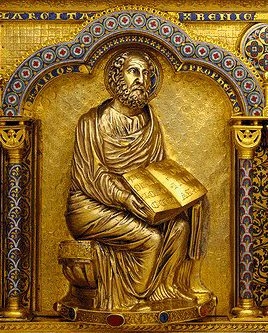By Dan Clendenin for Journey with Jesus

Amos, Cologne Cathedral, 12th century
“It’s hard to read Mark 6 about the beheading of John the Baptist and not think about the grotesque images of ISIS. Whatever else ISIS is doing, it’s pimping religion for a political cause.
“And that’s exactly what this week’s reading from Amos is about.
“Amos wrote 2,800 years ago, but his prophecy reads like today’s newspaper. He lived under king Jeroboam II, who reigned for forty-one years (786–746 BC). Jeroboam’s kingdom was characterized by territorial expansion, aggressive militarism, and unprecedented economic prosperity.
“Times were good. Or so people thought.
“The people of the day interpreted their good fortune as God’s favor. Amos says that the people were intensely and sincerely religious.
“But theirs was a privatized religion of personal benefit. They ignored the poor, the widow, the alien, and the orphan. Their form of religion degraded faith to culturally acceptable rituals.
“Making things worse, Israel’s religious leaders sanctioned the political and economic status quo. They pimped their religion for Jeroboam’s empire.
“Enter Amos. Amos preached from the pessimistic and unpatriotic fringe. He was blue collar rather than blue blooded. He admits that he was neither a prophet nor even the son of a prophet in the professional sense of the term.
” Amos was a shepherd, a farmer, and a tender of fig trees. He was a small town boy who grew up in Tekoa…. The cultured elites despised him as a redneck [and]… an unwelcome outsider. Born in the southern kingdom of Judah, God called him to thunder a prophetic word to the northern kingdom of Israel. And that’s what this rough hewn prophet did. He opposed the political powers of his day and the religious stooges who supported them. With graphic details that make you wince, Amos describes how the rich crushed the poor; the affluent with their expensive lotions, elaborate music, and vacation homes with beds of inlaid ivory; sexual debauchery in which a man and his son abused the same woman; a corrupt legal system that sold justice to the highest bidder; predatory lenders who exploited vulnerable families; and religious leaders who sanctioned it all.
“To the priests who defended, legitimized, and justified Jeroboam’s corrupt kingdom, Amos delivered an uncompromising word of warning. After Amaziah the priest informed Jeroboam that Amos’s preaching was unpatriotic and seditious, he tried to run him out of town. Then Amaziah said something that reveals how completely he had identified religious faith with political power and economic gain. It ought to send a chill up the spine of every religious leader who ever thought about sucking up to political power: ‘Don’t prophesy anymore at Bethel, because this is the king’s sanctuary and the temple of the kingdom.’ (7:13). With those words, the religious justification of political empire is complete, and faith is reduced to patriotic cheer-leading. But Amos wouldn’t be bullied. He had a word of his own for every priest who pimped religion for empire.”
